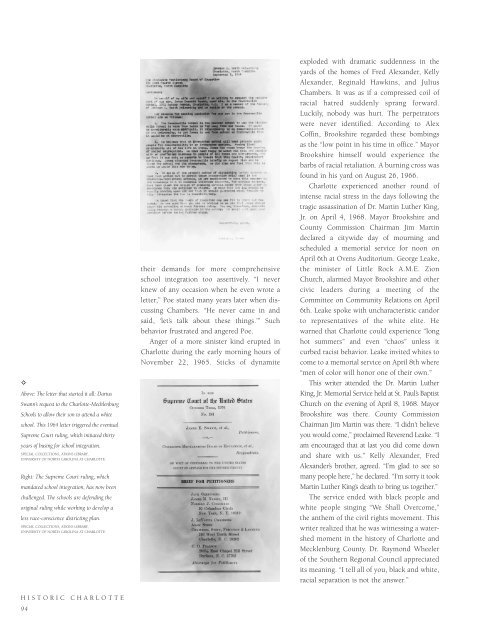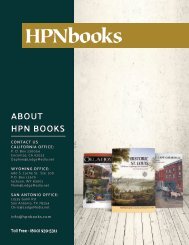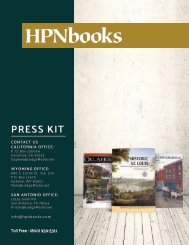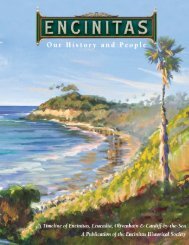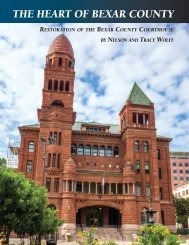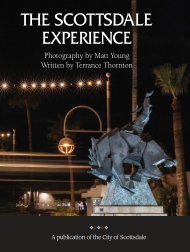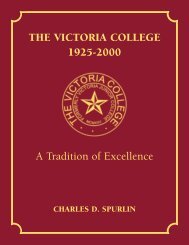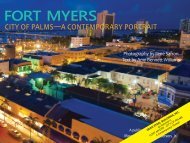Historic Charlotte
An illustrated history of the City of Charlotte and the Mecklenburg County area, paired with the histories of companies, families and organizations that make the region great.
An illustrated history of the City of Charlotte and the Mecklenburg County area, paired with the histories of companies, families and organizations that make the region great.
Create successful ePaper yourself
Turn your PDF publications into a flip-book with our unique Google optimized e-Paper software.
✧<br />
Above: The letter that started it all: Darius<br />
Swann’s request to the <strong>Charlotte</strong>-Mecklenburg<br />
Schools to allow their son to attend a white<br />
school. This 1964 letter triggered the eventual<br />
Supreme Court ruling, which initiated thirty<br />
years of busing for school integration.<br />
SPECIAL COLLECTIONS, ATKINS LIBRARY,<br />
UNIVERSITY OF NORTH CAROLINA AT CHARLOTTE.<br />
Right: The Supreme Court ruling, which<br />
mandated school integration, has now been<br />
challenged. The schools are defending the<br />
original ruling while working to develop a<br />
less race-conscience districting plan.<br />
SPECIAL COLLECTIONS, ATKINS LIBRARY,<br />
UNIVERSITY OF NORTH CAROLINA AT CHARLOTTE.<br />
their demands for more comprehensive<br />
school integration too assertively. “I never<br />
knew of any occasion when he even wrote a<br />
letter,” Poe stated many years later when discussing<br />
Chambers. “He never came in and<br />
said, ‘let’s talk about these things.’” Such<br />
behavior frustrated and angered Poe.<br />
Anger of a more sinister kind erupted in<br />
<strong>Charlotte</strong> during the early morning hours of<br />
November 22, 1965. Sticks of dynamite<br />
exploded with dramatic suddenness in the<br />
yards of the homes of Fred Alexander, Kelly<br />
Alexander, Reginald Hawkins, and Julius<br />
Chambers. It was as if a compressed coil of<br />
racial hatred suddenly sprang forward.<br />
Luckily, nobody was hurt. The perpetrators<br />
were never identified. According to Alex<br />
Coffin, Brookshire regarded these bombings<br />
as the “low point in his time in office.” Mayor<br />
Brookshire himself would experience the<br />
barbs of racial retaliation. A burning cross was<br />
found in his yard on August 26, 1966.<br />
<strong>Charlotte</strong> experienced another round of<br />
intense racial stress in the days following the<br />
tragic assassination of Dr. Martin Luther King,<br />
Jr. on April 4, 1968. Mayor Brookshire and<br />
County Commission Chairman Jim Martin<br />
declared a citywide day of mourning and<br />
scheduled a memorial service for noon on<br />
April 6th at Ovens Auditorium. George Leake,<br />
the minister of Little Rock A.M.E. Zion<br />
Church, alarmed Mayor Brookshire and other<br />
civic leaders during a meeting of the<br />
Committee on Community Relations on April<br />
6th. Leake spoke with uncharacteristic candor<br />
to representatives of the white elite. He<br />
warned that <strong>Charlotte</strong> could experience “long<br />
hot summers” and even “chaos” unless it<br />
curbed racist behavior. Leake invited whites to<br />
come to a memorial service on April 8th where<br />
“men of color will honor one of their own.”<br />
This writer attended the Dr. Martin Luther<br />
King, Jr. Memorial Service held at St. Paul’s Baptist<br />
Church on the evening of April 8, 1968. Mayor<br />
Brookshire was there. County Commission<br />
Chairman Jim Martin was there. “I didn’t believe<br />
you would come,” proclaimed Reverend Leake. “I<br />
am encouraged that at last you did come down<br />
and share with us.” Kelly Alexander, Fred<br />
Alexander’s brother, agreed. “I’m glad to see so<br />
many people here,” he declared. “I’m sorry it took<br />
Martin Luther King’s death to bring us together.”<br />
The service ended with black people and<br />
white people singing “We Shall Overcome,”<br />
the anthem of the civil rights movement. This<br />
writer realized that he was witnessing a watershed<br />
moment in the history of <strong>Charlotte</strong> and<br />
Mecklenburg County. Dr. Raymond Wheeler<br />
of the Southern Regional Council appreciated<br />
its meaning. “I tell all of you, black and white,<br />
racial separation is not the answer.”<br />
HISTORIC CHARLOTTE<br />
94


